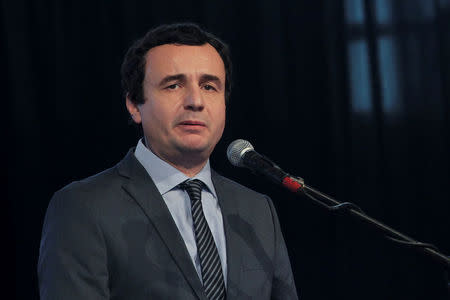Police arrest Kosovo opposition leader for no-show at court

By Fatos Bytyci
PRISTINA (Reuters) - Kosovo police arrested three lawmakers on Friday, including the popular main opposition leader whom they handcuffed in the street, after the three failed to appear in court on charges of releasing tear gas in parliament in 2015 and 2016.
Opposition lawmakers obstructed parliament for almost two years by letting off tear gas in the chamber in a protest against a border deal with Montenegro and an EU-brokered agreement with Serbia.
Albin Kurti, leader of Kosovo's biggest opposition party Vetevendosje, was seized and handcuffed by police close to parliament building when he was on his way to attend a regular session.
Police used paper spray to disperse several other lawmakers from Kurti's party who tried to hold onto him and prevent police from taking him away, Kosovo media showed. He was eventually moved into a police van.
Kurti won more votes than any other political candidate and his party came first in June snap elections, but he did not enter the ruling coalition.
All three MPs were given one month detention, Dukagjin Gorani of Vetevendosje told Reuters later in the day.
Dozens of other MPs have been indicted so far for releasing tear gas in the 120-seat parliament.
"This is the continuation of a massive and wide-ranging persecution that has started against Vetevendosje," the party president, Visar Ymeri, said.
Last week a court in Pristina sentenced four people, including one member of parliament, to prison terms ranging from two to eight years for taking part in a grenade attack against the parliament building last year. They were all loyalists of Vetevendosje.
Opposition parties oppose the border deal with Montenegro saying the country of 1.8 million is losing land by handing over some 8,000 hectares (19,700 acres).
The opposition is also against a deal signed in 2013 between Pristina and Belgrade as part of an EU-sponsored dialogue that would give more rights to the local Serb minority. They say the deal will practically divide the poor Balkan country on ethnic lines.
Kosovo declared independence from Serbia in 2008, nearly a decade after NATO bombing drove Serb forces from the territory.
(Reporting by Fatos Bytyci; Editing by Ivana Sekularac and Richard Balmforth)

